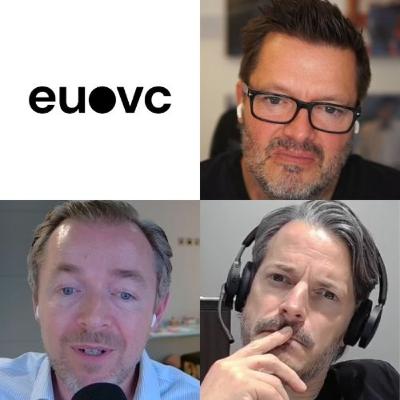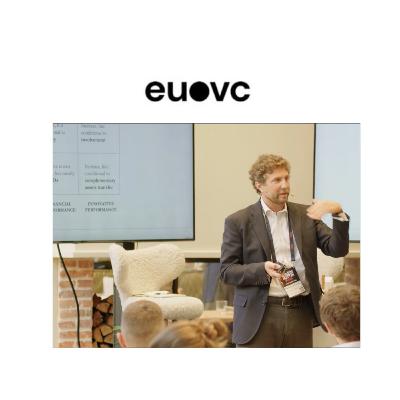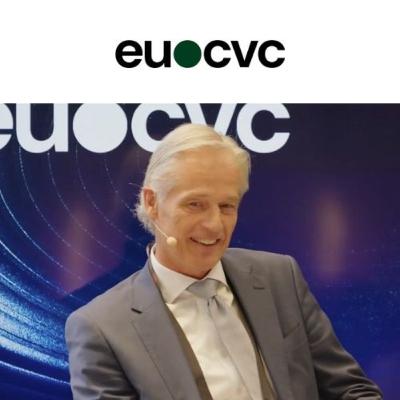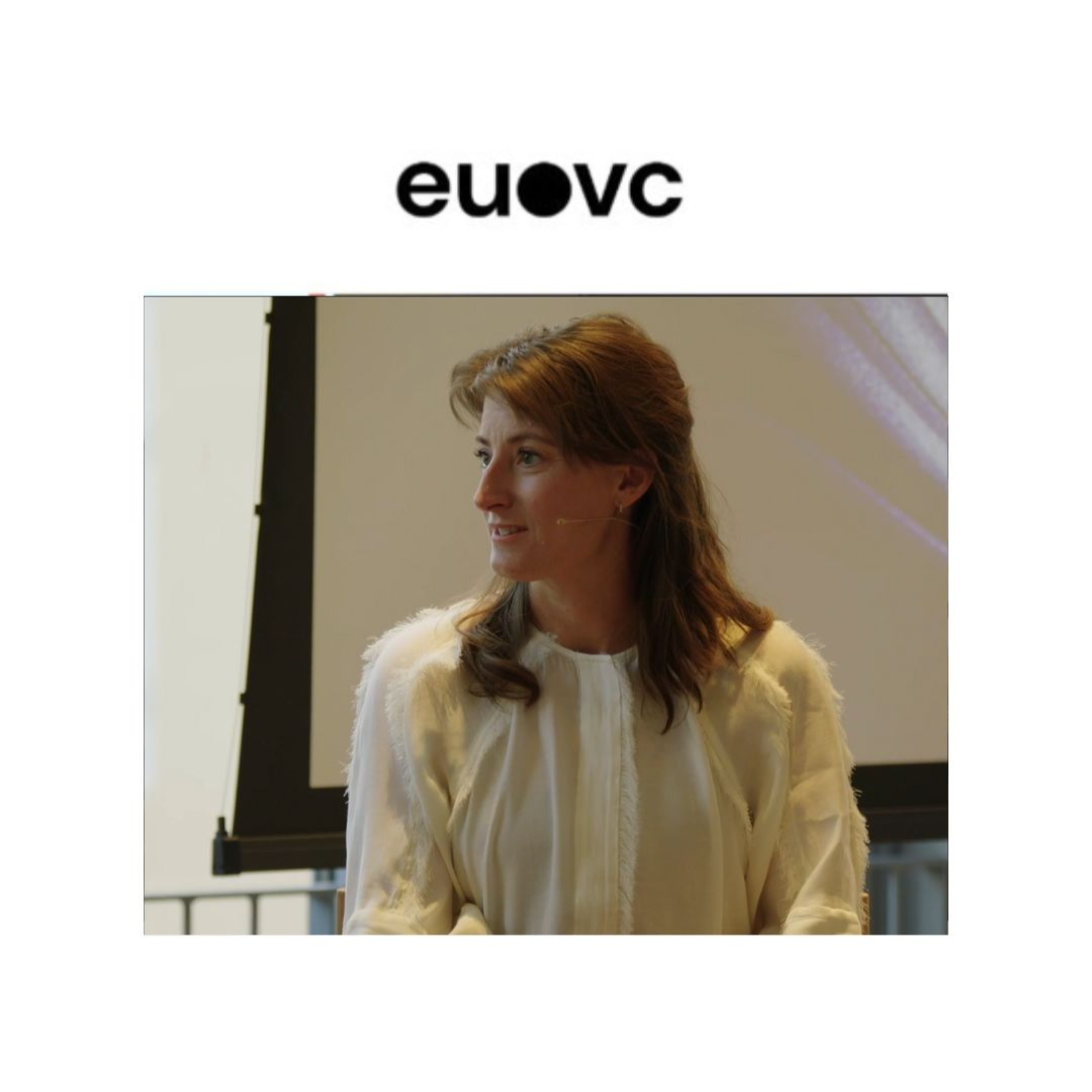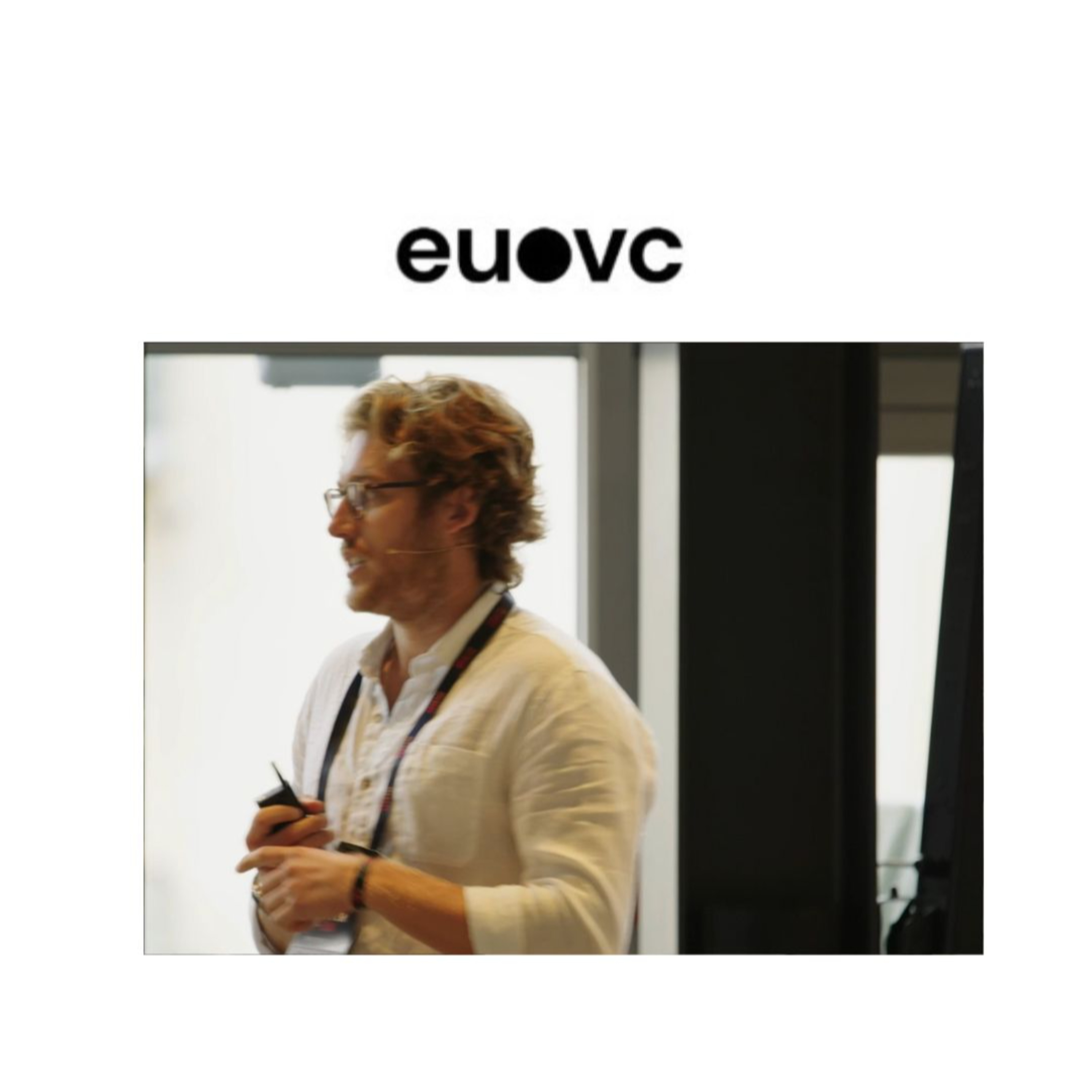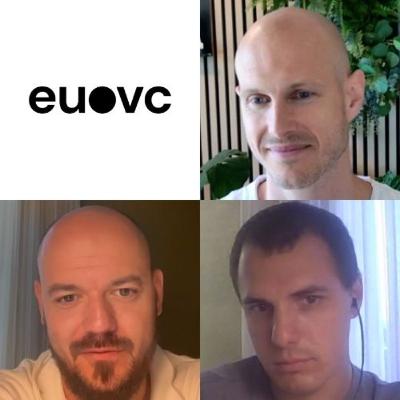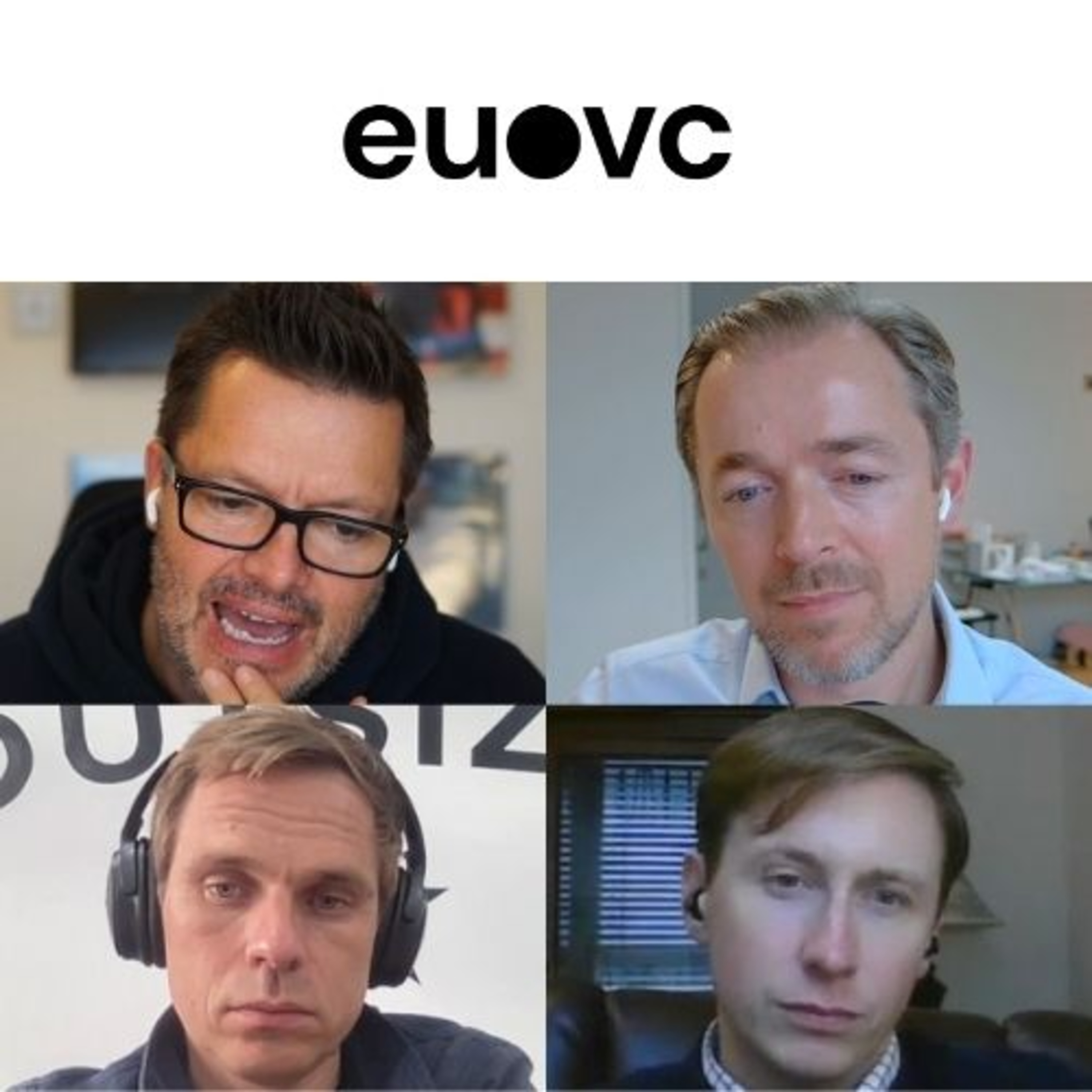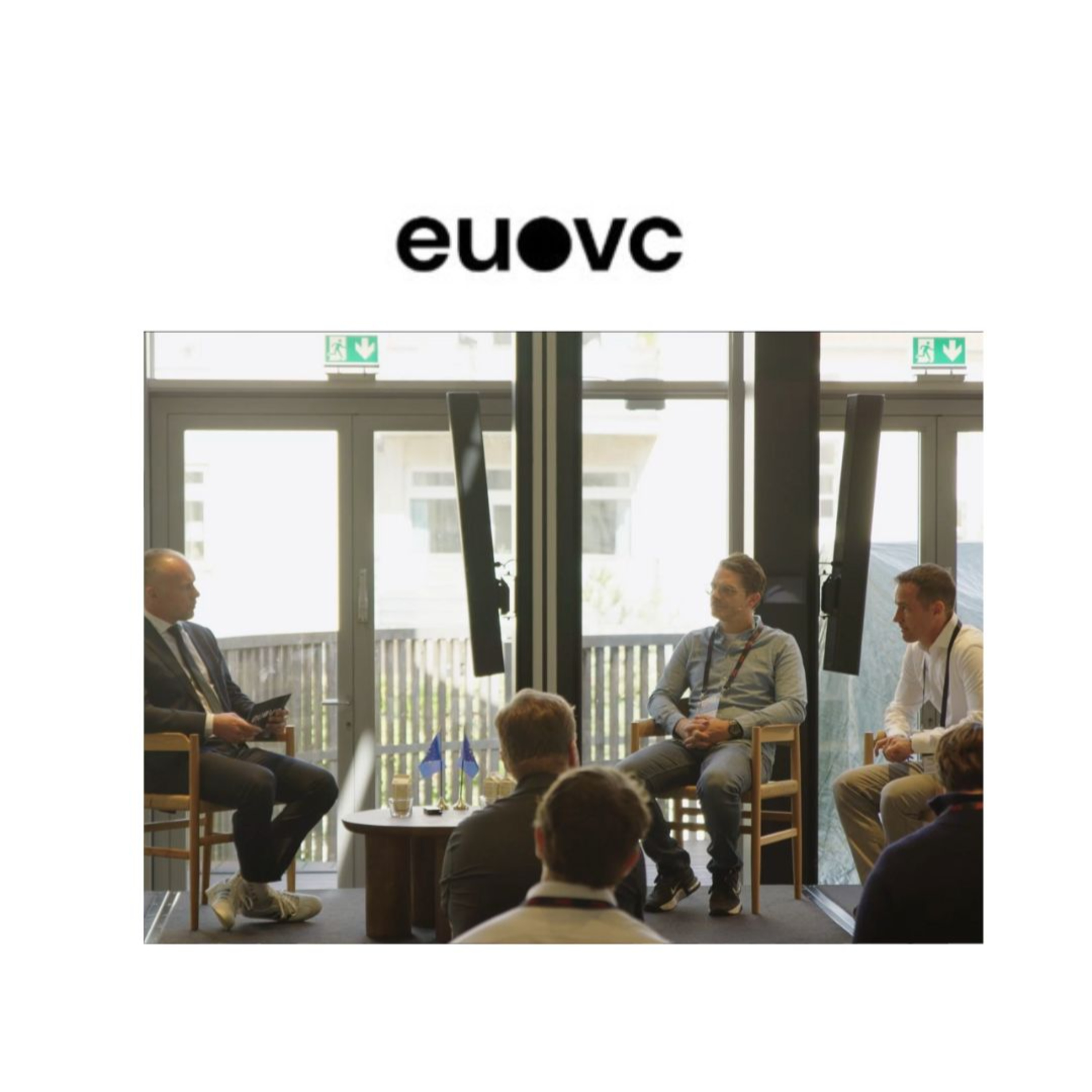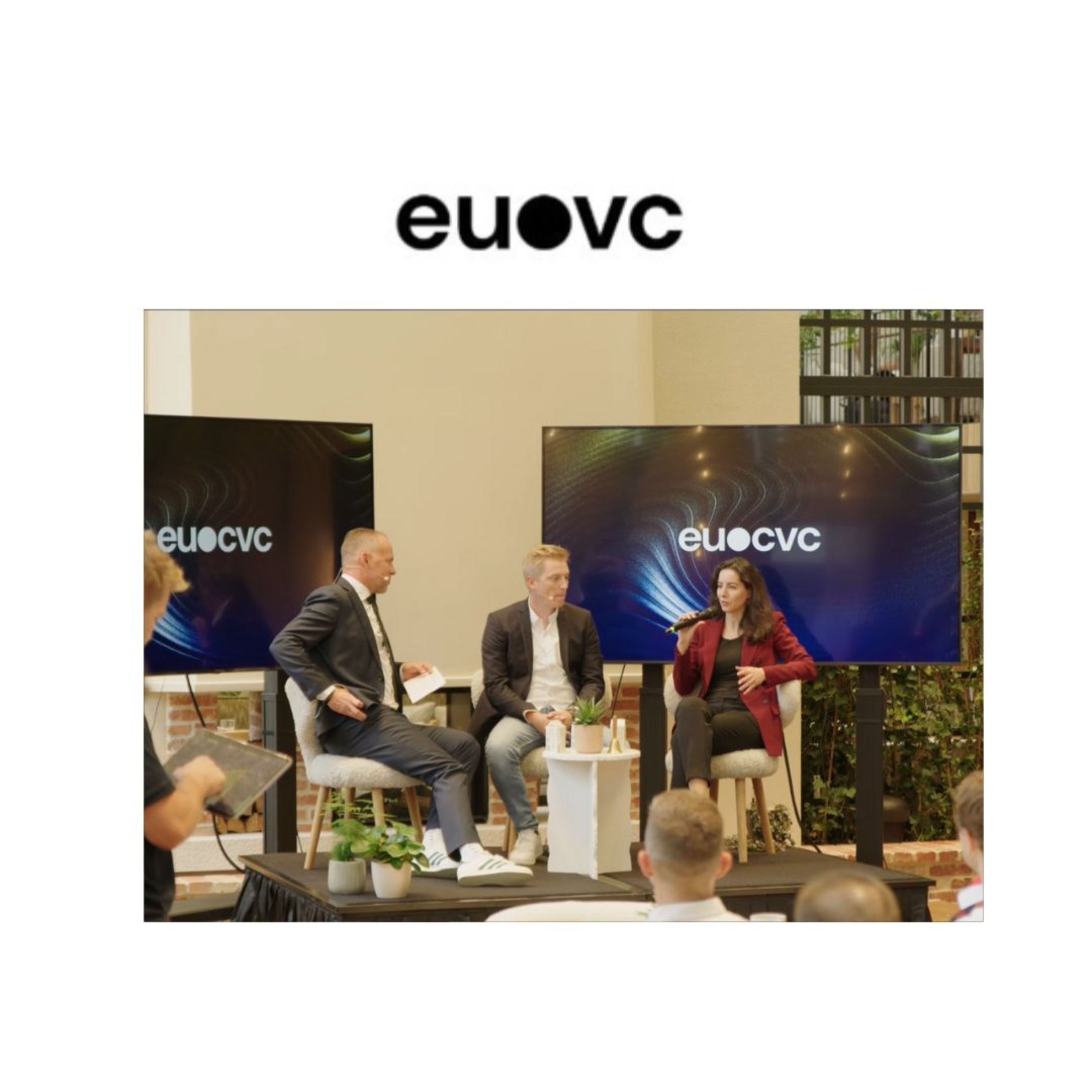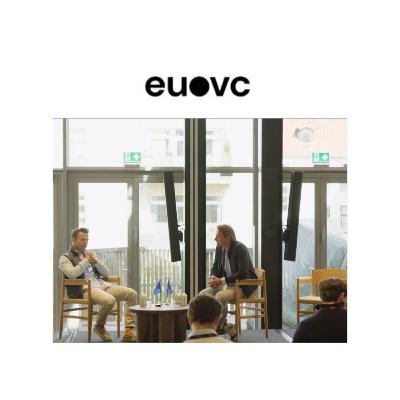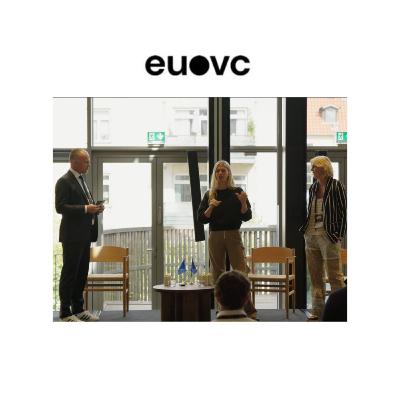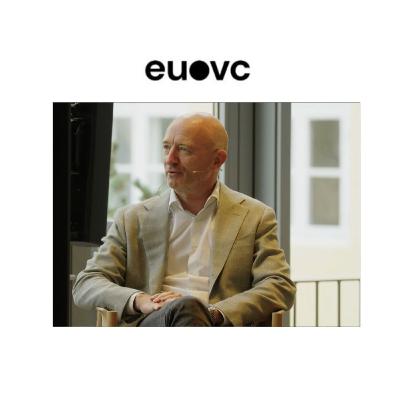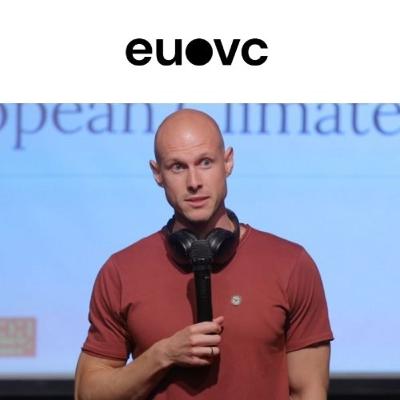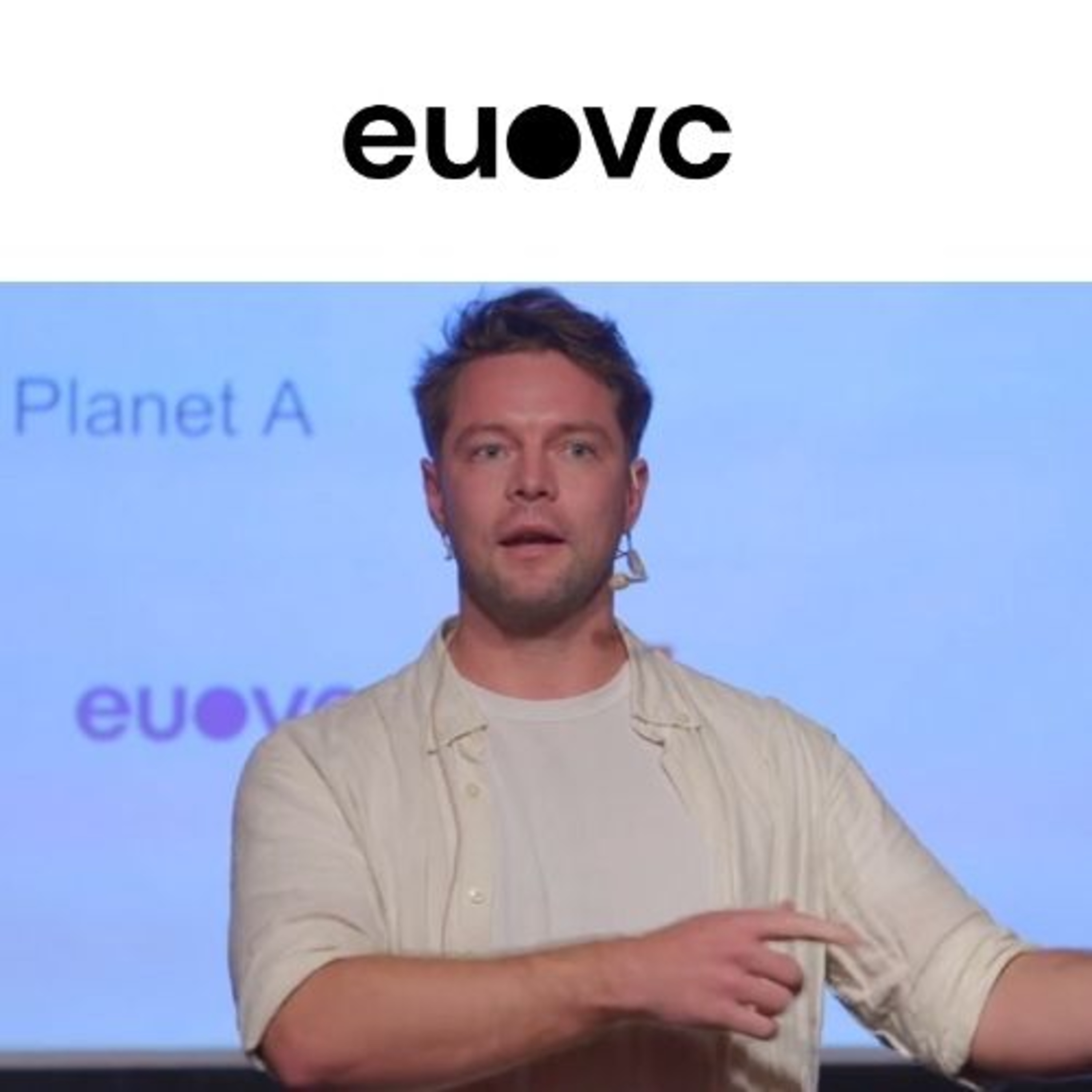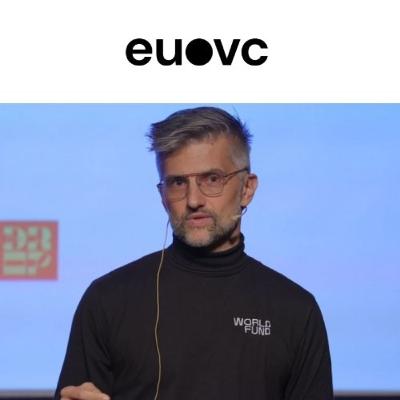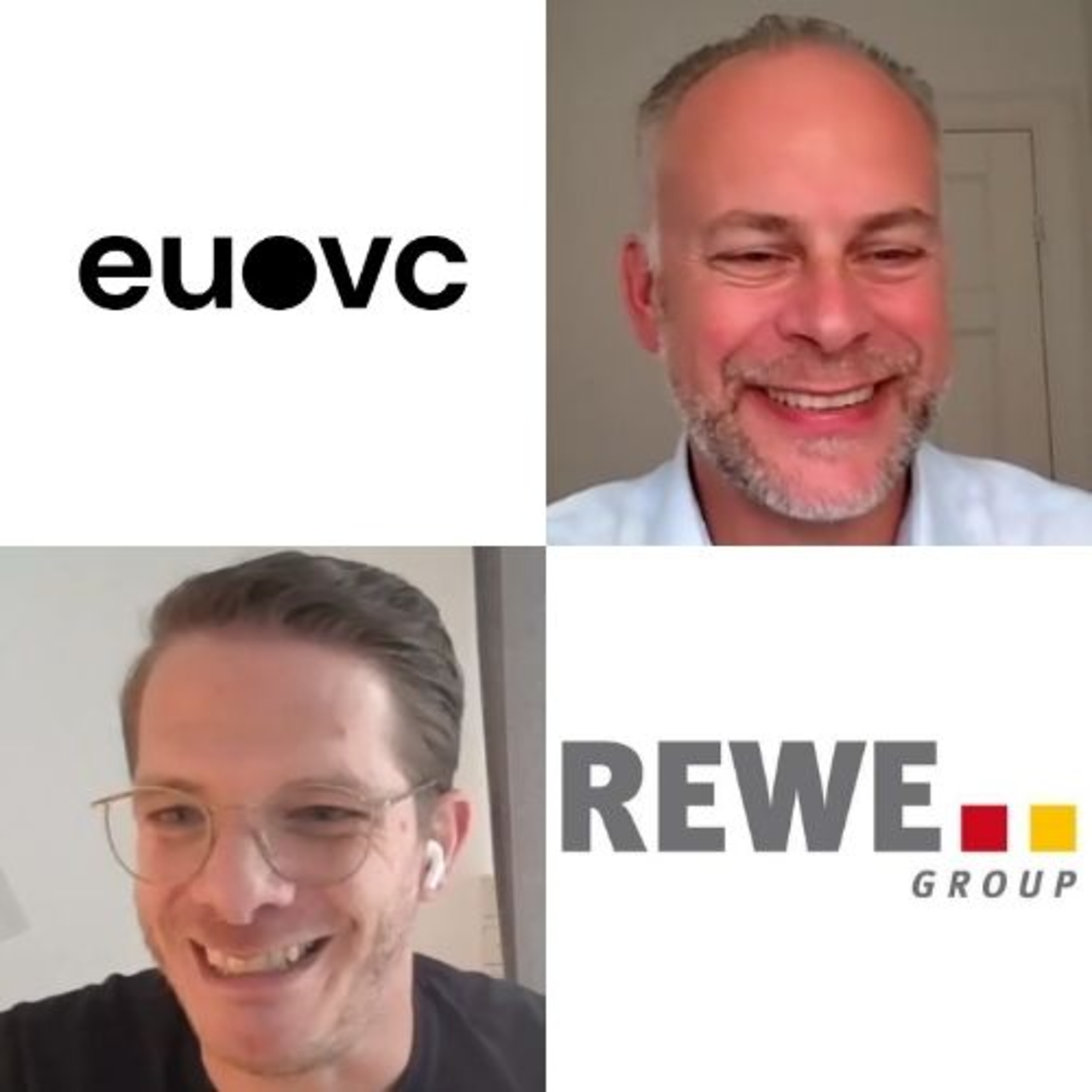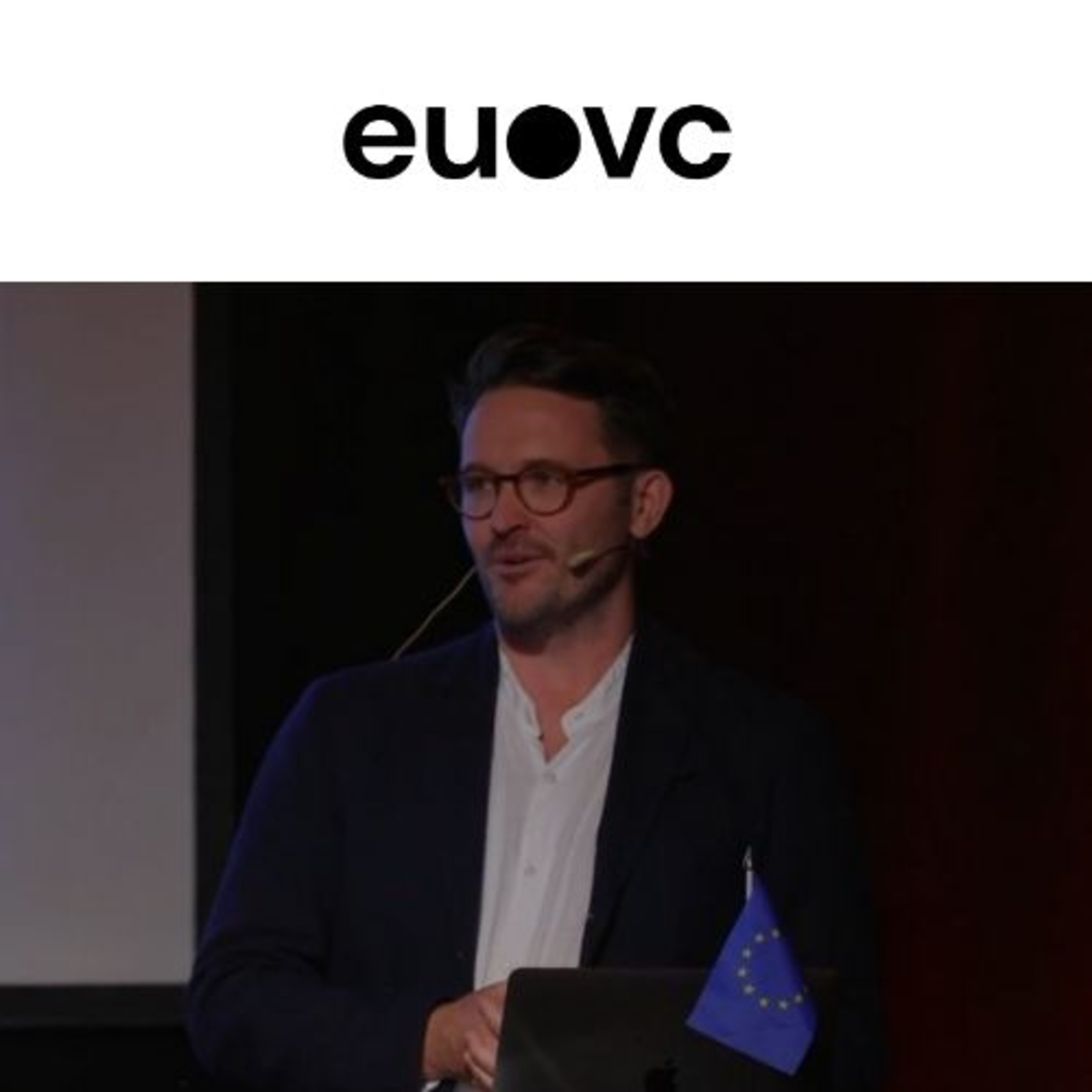Discover EUVC
EUVC

EUVC
Author: The European VC
Subscribed: 39Played: 2,236Subscribe
Share
© The European VC
Description
EUVC is your go-to podcast for everything European VC. Co-hosted by Andreas Munk Holm and David Cruz e Silva, EUVC features some of the most prominent people from the European VC industry, giving you a fresh new perspective on the industry and geo we love.
Follow us and stay in the loop with everything European VC on eu.vc
Follow us and stay in the loop with everything European VC on eu.vc
637 Episodes
Reverse
In this episode, Andreas Munk Holm speaks with Anders Kjær, General Partner at PSV Hafnium, Denmark’s first dedicated deep tech fund. Together, they explore the evolving role of technical founders, the Nordic research-industrial complex, and how early-stage deep tech capital needs to work differently to unlock tomorrow’s transformative companies.Here’s what’s covered:01:30 Why PSV Hafnium Was Built—and the Deep Tech Opportunity in the Nordics04:13 PSV Hafnium as a Symbol of Deep Tech: The Element & the Brand08:24 Turning Research into Portfolio Power: DTU's Role in Diligence & Support10:19 Can a Copenhagen-Based Fund Compete Across the New Nordics?14:26 Nordic Tech Clusters: Are There Regional Strengths or Pure Serendipity?19:43 Bio Solutions, Green Energy & Industrial Legacy: Why Deep Tech Thrives Here21:15 Sciencepreneurs Rising: Shifting Founder Mindsets in Deep Tech24:52 How PSV Hafnium Gauges Entrepreneurial Readiness in Deep Tech Teams27:44 What Generalist VCs Get Right—and Wrong—About Deep Tech30:18 What “European Resilience” Actually Means at the Early Stage36:18 The Common Thread in All Deep Tech Bets (Hint: It’s Not Sector)42:09 Bridge Rounds in Deep Tech: A True Test of Conviction45:53 Rapid Fire: Nordic Bets, Myths to Kill, & Advice to Scientist Founders
Welcome to a new episode of the EUVC Podcast, where our good friends Dan Bowyer and Mads Jensen from SuperSeed are joined by Lomax Ward from Outsized Ventures and Ben Prade, investor & operator at Bullhound Capital (the investment arm of GP Bullhound), for an unfiltered look at Europe’s venture reality: fundraising pain, secondaries-as-a-service, AI’s power hunger, China’s “dark factories,” and how Europe unlocks the capital to compete.Ben focuses on deep tech, AI, quantum, and space, and he brings a clear-eyed view on how liquidity, secondaries, and structural headwinds are reshaping the market.🎧 Here’s what’s covered02:35 Fundraising reality: fewer funds, flight to brandsWhy ~25% of new VC money goes to the top 10 brands; what that means for emerging managers; and why DPI is king again.05:26 Sovereign LPs & strings attachedWhen government money shapes mandates: the upside (more capital) and the risk (policy over performance).06:45 Chinks of light: Klarna & liquidityHow high-profile exits (and lock-ups ending) can recycle cash back into European VC.09:37 Goldman buys Industry VenturesWhy a Wall Street giant wants secondary data + wealth distribution — and how that can unclog LP portfolios.13:08 Nobel Prize & growth mechanicsCreative destruction (Aghion–Howitt) meets realpolitik: state de-risking, catch-up industrialization, and China’s “build both infra and innovation” model.21:24 AI’s “everything app” momentOpenAI’s ~30 GW compute plan (> $1T decade CapEx), Google’s ad-cash advantage, and the looming pricing showdown.25:09 Circularity vs. realityVendor-financing analogies in AI, but remember: revenue expectations — not loops — pop bubbles.28:03 Unit economics: AI ≠ SaaSNegative gross margins down the stack; LLMs climbing into apps; why vertical data + UX decide winners.32:02 China’s dark factoriesExecs return “shaken”: robotized plants, BYD’s surge, and how physical AI (motors, batteries, autonomy) changes competitiveness.39:29 Unleashing Europe’s capitalJP Morgan’s $1.5T initiative vs. European pensions stuck in gov bonds; rewiring incentives to fund productive risk.45:00 Deal of the Week: ecoRobotix€90M Series D (Highland Europe, McWin). Precision AI spraying that cuts herbicides/pesticides by up to 95% across 20+ countries.
Welcome back to the EUCVC Summit Talks, where we spotlight Europe’s corporate venture leaders, founders, and academics shaping the future of venture collaboration.In this episode, Francesco Di Lorenzo, Associate Professor at Copenhagen Business School, takes the stage to share fresh research on the state of corporate venture capital (CVC) in the Nordics. From Sweden to Denmark, Francesco explores how corporates are experimenting with different venturing models, what makes CVC effective, and why Nordic corporates are some of Europe’s most important venture partners.Rather than polished slides, Francesco offers candid reflections from the Summit itself: the open questions corporates face, the trade-offs in structuring CVC units, and why cultural change in the boardroom is key if corporate venturing is to succeed long-term.🎧 Here’s what’s covered00:00 Nordic snapshot — Why the region punches above its weight in tech and CVC.01:00 Tools beyond CVC — Incubators, accelerators, and venture clienting: complementary or conflicting?03:00 The CVC effect — Beyond capital: what corporates bring to the table (and why it matters).05:00 Measuring success — Why CVC units last only 3.7 years on average and the difficulty of proving ROI.07:00 Smart money vs. just money — How engineer exchanges and board participation can be more impactful than capital alone.08:00 Venture clienting — A rising model where corporates act as first customers instead of investors—and the risks it carries.10:00 Governance cycles — Why CVC units live and die with CEO tenure, and why board-level protection is essential.11:00 Collaboration vs. competition — What data says about corporates co-investing (and when they don’t).13:00 Nordic findings — Early results from research in Norway, Finland, and Sweden: small portfolios, early-stage focus, and bureaucracy as the top blocker.14:00 AI paradox — Corporates investing in AI startups but cutting internal AI budgets—what this signals for the future.
Welcome back to the EUCVC Summit Talks, where we bring you candid conversations with Europe’s leading founders, corporate leaders, and investors shaping the future of venture collaboration.In this session, Christian Tang, Partner at San Francisco–based Acme, and Claus Gregersen, CEO of the 275-year-old evergreen investor Augustinus Fabrikker, explore what global ambition really means in today’s venture landscape.From recalibrating US expansion strategies to navigating sovereignty, trade tensions, and structural resets, they unpack how investors and founders must adapt to thrive in a more complex—but still interconnected—world.🎧 Here’s what’s covered:00:00 Setting the stage: Cycles, crises, and why this downturn feels different.02:00 Structural reset, not just another downturn—why waiting for “normal” is not an option.03:30 Investors as navigators, not moral arbiters—what it means in practice.04:15 Why the US remains critical: learning, scaling, and surviving tough competition.06:00 Page nine of every pitch deck: the inevitable US expansion slide.07:20 Trade tensions vs. venture building—why early-stage models aren’t derailed by politics.08:30 The importance of value-adding capital—choose partners for impact, not geography.09:15 Lessons from COVID and defense: building lean, fast, and resilient.10:00 Closing thoughts: capital may be scarcer, but ambition must remain global.
Welcome back to the EUCVC Summit Talks, where we bring you candid conversations with Europe’s leading founders, corporate leaders, and investors shaping the future of venture collaboration.In this episode, Anne C. Fleischer, Global VP of Consumer Engagement and New Business Models at Novo Nordisk, joins Henrijette Richter, Managing Partner at Sofinnova Partners, for a conversation on the future of health innovation.Together they explore how corporates and VCs are driving the next wave of digital health, the role of AI in transforming patient care, and what it takes to turn breakthrough science into scalable business models.🎧 Here’s what’s covered:00:00 Pharma’s digital leap — why Novo Nordisk is going “beyond the pill” with AI and personalized engagement.01:30 The investor’s lens — what makes AI-driven health fundable versus “still a science project”.03:00 AI at the patient interface — where machine learning is closest to real-world integration.04:30 Corporate + VC collaboration — how pharma and venture can align (and where they clash).06:00 Scaling deeptech in health — what it takes for startups to go global from day one.07:30 Consumerization of health — balancing trust, privacy, and the impatience economy.08:45 Europe’s edge — strengths in science and regulation, risks of falling behind the U.S..09:30 Lightning round — the next big thing in health innovation: specificity for patients.
Corporate venture capital has become a $100B+ force in tech. Charlie Hayward from Global Corporate Venturing unpacks what’s really driving the trend: which sectors are heating up, where CVCs make a difference, and how Europe stacks up under capital constraints and geopolitical pressure.Here’s what’s covered:00:00 – Setting the stage: CVC as a $100B+ global force01:00 – Why corporate venture matters: from Microsoft’s outlier story to the role of corporate backers03:00 – Active CVC units: stock performance and why entrepreneurs should care04:00 – Lower bankruptcy risk & higher exit multiples for CVC-backed startups05:00 – State of play: fundraising headwinds, but CVCs take the long-term view05:30 – Early-stage shift: corporates getting active in seed & pre-seed rounds06:00 – Global hotspots: Latin America and APAC showing strong momentum07:00 – What CVCs bring: board seats, portfolio support, but still lighter on financial-return expectations08:00 – Who plays the game: large corporates with $1B+ revenues dominate, but LP stakes open doors for smaller players09:00 – New frontiers: universities, accelerators, and venture clienting as the next CVC battlegrounds
Welcome back to the EUCVC Summit Talks, where we bring you candid conversations with Europe’s leading founders, corporate leaders, and investors shaping the future of venture collaboration.In this session, Marcus Behrendt, Managing Director at BMW i Ventures, and Nicole LeBlanc, Partner at Woven Capital (Toyota’s global growth fund), join Andreas Munk Holm to explore the shifting landscape of mobility and corporate venture.From navigating capital-intensive hardware bets to finding the balance between strategic alignment and financial discipline, Marcus and Nicole share what they’ve learned running two of the world’s most active mobility CVCs. They open up on exits, collaboration with startups, and how CVCs must evolve to remain relevant in an era of autonomous, connected, and electrified vehicles.🎧 Here’s what’s covered:00:00 BMW i Ventures’ journey from corporate “experiment” to one of Europe’s most established mobility CVCs.01:00 Woven Capital’s global mandate — $800M to invest in growth-stage companies shaping the future of mobility.02:00 Strategic vs. financial returns: how to keep credibility with founders while serving corporate parents.04:00 The hard part of hardware — why scaling in mobility takes patient capital and operational backing.06:00 Startups + corporates = frictions and opportunities — lessons from portfolio collaborations.08:00 Exit realities: IPO droughts, M&A dynamics, and how mobility startups find liquidity.10:00 The next decade of CVC in mobility: sustainability, AI, and cross-border collaboration.
Welcome back to another episode of the EUVC Podcast, where we bring you the people and perspectives shaping European venture.Today, we’re joined by Alexey Plesakov and Alexander Lis from Social Discovery Ventures (SDV) — a quietly influential, globally active investment firm deploying capital across the US and Europe. Born out of the bootstrapped success of Social Discovery Group (the company behind Dating.com), SDV invests in both funds and directs, with a venture allocation far above the family office norm.We dive into their origin story, why they’re leaning into Europe now, their approach to fund vs. direct investments, and how they think about the future of VC in a more uncertain macro climate.🎯 This Episode’s Themes:From bootstrapped dating giant to global LP & VC playerWhy diversification isn’t just about having “more investments”How they balance US vs. European VC allocationsThe case for emerging managers — and the collaboration edge they offerWhere they see the biggest bets in European tech over the next decadeWhy they’re playing more conservatively in 2025 — without stopping deal flowLessons from building lean — and the “Five Whys” test for cutting through hype🎧 Here’s what’s covered:00:24 | Welcome & Origin Story: From Dating.com to a global investment portfolio01:24 | Bootstrapping a Unicorn: How Social Discovery Group scaled without outside capital04:38 | The Myth of Diversification: Quality over quantity in portfolio construction06:19 | Why 30%+ of Their Assets Are in Venture Capital08:44 | Leveraging Network Effects: How their IT roots give them an edge in sourcing deals09:31 | VC Fund Portfolio: From NEA & Khosla to emerging managers like Davydov & Black River14:26 | US vs. Europe: Why their overall portfolio skews 70% US but VC is more balanced15:55 | Emerging Managers vs. Big Names: Risk, return, and picking the right early funds19:41 | Big Picture Bets: Tariffs, decoupling, and a possible US–Europe tech split22:31 | Direct Investment Focus: Fintech, PSD3, and voice-first neobanking25:07 | Macro vs. Micro: Combining top-down analysis with bottom-up deal work27:05 | Playing Defense in 2025: Why they’re slowing deployment without stopping pipeline building30:23 | European VC Arbitrage: Lower valuations — until growth takes off34:23 | Bootstrapping Lessons: Discipline, burn control, and ROI-driven decisions35:25 | The “Five Whys” Test: Cutting through hype to find fundamentally sound investments
With: Nicholas Nelson (Archangel) • Dan • Lomax • MadsTL;DW• Defence-first wins on capability and returns; primes are partners and channels.• Helsing: buys platforms/revenue for access; layers AI—different from Anduril’s buy-TRL-tech + scale model.• Beyond drones: biggest gap/opportunity is tactical EW.• Procurement: more fast lanes (SOF, pilots); primes getting easier to work with.• AI: real profits exist (esp. NVIDIA), but value chain is fragile; expect a correction, not a collapse. Picking winners more important than timing.Content with Time Codes02:40 — Why defence-firstBeats dual-use on outcomes and returns; lifelong focus.04:32 — DefinitionsCustomer = MoDs + primes; aim: lethality/readiness and societal resilience. Beware “defence-washing”.06:37 — What’s hotAvoid herd to drones only; counter-UAS, EW, human performance, deception, survivability.08:23 — Helsing buys GrobNeo-prime play: new co buys legacy manufacturing for platform access.10:42 — The two Defence M&A playbooksAnduril: buys mid-TRL tech (Area-I, Dive LD/Ghost Shark, Adranos) → scales via brand/distribution.Helsing: buys finished products/revenue (Mittelstand) → immediate customers; then add AI.14:25 — Prime status & capitalDistribution + capital to AI-enable platforms.17:47 — Roll-up vs buildNarrative “build”; execution “roll-up + build”.19:47 — Drones & ‘drone wall’Layered answer: blunt with drones, hold with conventional forces.21:49 — The big one: Electronic Warfare (EW)NATO underinvested; tactical EW is the unmet need; legacy kit is ’80s/’90s.24:54 — Startup wedgePut EW at the edge (drones/aircraft/fixed) → near-term wins.26:33 — Baltic realismHistory, 2007–09 Estonia cyber, current incursions; likely Kaliningrad corridor.28:19 — Founder mistakesTech ≠ win by itself; experience + gov engagement matters; US analogue: top funds have IC/SOF DNA.30:43 — Are there really only a “Few buyers?”Many real buyers inside a MoD/DoD (services, sub-units, innovation orgs).36:23 — Sovereignty & US primesUS strategics will buy abroad; Europe balancing autonomy with jobs/exits.41:07 — Starlink vs IRIS²Starlink’s lead + cadence; IRIS² slower—watch timelines vs evolving threats.47:18 — AI bubble?Warnings vs fundamentals; self-funded capex; real profits.49:37 — NVIDIA ramp$4.4B (2023) → $73B this year; growth tempers multiples.51:48 — AI Circular money & marginsCursor → Anthropic → hyperscalers → NVIDIA; only NVIDIA mints big margins; margin pressure coming (new semis, China, SLMs).53:12 — Picking beats timingDot-com lesson: Cisco losses vs Amazon wins.54:19 — Capacity vs efficiencyCapex likely useful long-run, but open source squeezes costs.55:52 — Platform riskFrontier labs moving up-stack; vertical AI + trust + data = moat.58:58 — Base caseLikely correction (30–50%) at some point; timing is unknowable (not investment advice).
Welcome back to the EUCVC Summit Talks, where we bring you the voices shaping Europe’s venture and corporate collaboration landscape.In this episode, Andreas Munk Holm speaks with Tanja Lind Melskens, Head of Corporate Strategy and M&A at Terma, Denmark’s tier-one defense technology group. As Europe re-arms and defense spending surges, Tanja shares how startups, corporates, and investors must rethink dual-use technology, navigate inflated wartime valuations, and prepare for the post-conflict market.From frontline innovation in Ukraine to the challenges of ESG in defense tech, this conversation sheds light on one of the most important—and controversial—frontiers for venture collaboration.00:00 Europe’s re-armament: rising budgets, real opportunities—and inflated valuations.01:30 Ukraine as the “Silicon Valley of defense tech”: 4 million drones a year and frontline R&D.03:00 Why startups must prepare for the post-conflict market, not just donation-driven sales.04:30 Terma’s Kyiv subsidiary and partnerships with Ukrainian startups.06:00 Drone wars and critical infrastructure: protecting energy, transport, and hospitals.07:00 ESG in defense: compliance vs. survival in frontline innovation.08:00 Risks no VC faces: working with founders whose survival is uncertain.💡 One-liner takeaway: Europe’s defense tech boom is real but risky—success depends on bridging frontline innovation with post-conflict markets, and balancing ESG ideals with the brutal realities of war.
Welcome back to the EUCVC Summit Talks, where we bring you candid conversations with Europe’s leading founders, corporate leaders, and investors shaping the future of venture collaboration.In this session, Andreas Munk Holm is joined by Crispin Leick, Managing Director of EnBW New Ventures, Georg Reifferscheid, Head of Sustainability Ventures at REWE Group, and Jeppe Høier. Together, they explore how corporates are deploying capital, rethinking supply chains, and integrating AI to tackle Europe’s most urgent challenge: the energy transition.From evergreen venture models to decarbonizing retail operations, the discussion dives deep into how industrial and consumer giants are investing, where capital is moving fastest, and why success still depends on aligning financial and strategic incentives.🎧 Here’s what’s covered00:00 The energy transition is here — Europe’s corporates on the frontlines.01:00 Evergreen VC at EnBW New Ventures — why Crispin calls it the “best decision ever.”03:00 REWE Group’s sustainability mandate — tackling scope 1, 2, and 3 emissions.05:00 Where venture capital meets infrastructure — smarter, more capital-efficient deployment.06:00 AI in energy — real-world use cases from batteries to trading algorithms.07:00 Cooling, HVAC, and sustainable construction — REWE’s innovation priorities.08:00 Financial return first — why strategic impact only follows startup success.09:00 Incentives matter — why carry and financial alignment are make-or-break in CVC.✍️ Show NotesEvergreen Model at EnBW New VenturesUnlike closed-end CVC funds, EnBW’s evergreen structure reinvests all exit proceeds into new startups.This creates stronger alignment with founders and sharper accountability for the investment team.Crispin: “It’s the best decision we made in nine years — we’re entrepreneurs ourselves.”Decarbonizing Retail at REWE GroupSustainability ventures are embedded directly in operations.Current focus: scope 1 & 2 emissions (energy, mobility, buildings).Scope 3 (supply chain) remains the hardest challenge due to missing data and supplier dependency.AI in EnergyNot chasing LLMs or infrastructure — instead focusing on applied AI.Examples: battery analytics for health monitoring; algorithmic trading in intraday power markets.Innovation Priorities at REWECooling and HVAC with natural refrigerants.Alternative building materials (wood, green concrete).Greener retail store construction.Financial First, Strategic SecondFor both corporates, financial returns are non-negotiable.Strategic impact only comes if startups succeed.Incentives (including carry) are key for aligning CVC teams with true financial discipline.💡 One-liner takeaway: The energy transition needs corporates that invest like VCs — financially disciplined, strategically relevant, and willing to back startups tackling Europe’s toughest infrastructure and sustainability challenges.
Welcome back to the EUCVC Summit Talks, where we bring you ground-level conversations with the founders, corporate leaders, and investors shaping Europe’s innovation future.In this episode, Andreas Munk Holm sits down with Nadia Carlsten, VP at DCAI, and Bjarke Ruse Sejersen, CEO of Go Autonomous, to explore how Europe is putting AI hype into practice. From Denmark’s launch of the Gefion supercomputer to startups training proprietary models, this conversation dives into the reality of building AI factories that deliver business value — and what it will take for Europe to compete globally.Nadia shares why compute sovereignty matters and how Denmark is positioning itself as a hub for large-scale AI innovation, while Bjarke explains how Go Autonomous trained the world’s first B2B foundation model — and why European startups need braver investors to seize the AI-native future.🎧 Here’s what’s covered:00:00 Forget the AI hype — why compute sovereignty matters for Denmark and Europe.01:40 From infrastructure to innovation — Nadia on how Gefion enables Danish startups and researchers.02:15 Go Autonomous’ leap — Bjarke on training the world’s first B2B foundation model.03:20 Scale in action — handling €30B annually with tailor-made AI.04:00 Adoption gap — Nadia on why Denmark must accelerate real-world AI use cases.05:20 Capital mindset — Bjarke on why Europe lags the U.S. in risky AI-native investments.06:30 Investor responsibility — Nadia on knowing which startups are fine-tuning vs. building foundational models.07:30 Green AI — Europe’s unique advantage: pairing supercomputing with sustainability.08:15 The missing link — Nadia on translating business ambition into compute-ready AI projects.09:00 Corporate + startup collaboration — Bjarke on why structured partnerships could be Europe’s AI superpower.
Welcome back to the EUCVC Summit Talks, where we bring you candid conversations with Europe’s leading founders, corporate leaders, and investors shaping the future of venture collaboration.In this session, Sead Bajrovic of Water Impact Partners and Gijs de Bruin of PureTerra Ventures take the stage to unpack one of the most overlooked challenges in climate investing: water. From scarcity and pollution to corporate resilience and trillion-dollar opportunities, they explain why water technology must become a central pillar of Europe’s impact and climate strategy.🎧 Here’s what’s covered00:00 Why water is the “oil that runs everything” — and why it’s undervalued.01:00 The hard facts: only 0.3% of Earth’s water is accessible, and demand will outstrip supply by 40% by 2030.02:30 Legacy systems can’t cope — why centralized water treatment is failing.04:00 Corporate risk: data centers, manufacturing, and the Amazon Arizona case.05:00 Who’s leading: Apple, BASF, and L’Oréal’s water stewardship programs.06:00 Investment shift — from niche impact to mainstream VCs entering water.07:00 UN data: every $1 invested in water resilience returns $7.08:00 Innovation spotlight: AI, software, and applied technologies for efficiency.09:00 The most disruptive thing? Corporates putting real money into water.
Welcome back to the EUCVC Summit Talks, where we bring you candid conversations with Europe’s leading founders, corporate leaders, and investors shaping the future of venture collaboration.In this session, Andreas Munk Holm speaks with Bodil Sidén, Founding Partner at Kost Capital, and Marika King, Head of PINC, the venture arm of Paulig. Together, they explore how Europe can reinvent food systems to feed 10 billion people by 2050—without destroying the planet.From test kitchens and Michelin chefs in VC funds, to evergreen corporate models and the hunt for plastic-free packaging, Bodil and Marika share their unique approaches to food and agri-tech investing, the biggest opportunities ahead, and what they look for in founders building the future of food.🎧 Here’s what’s covered00:00 Feeding 10 billion people by 2050 — why food is “different” and needs a new venture model.01:00 Inside Kost Capital’s test kitchen — from Michelin chefs to food historians in due diligence.02:00 PINC’s evergreen model — why speed and long-term capital matter for food innovation.03:00 Execution over ideas — why market obsession beats product obsession.04:00 The secret sauce: validating food science claims in real time.05:00 When corporates add value without killing agility — the good and bad of CVC in food tech.06:00 The holy grail: plastic-free packaging that behaves like plastic.07:00 Big bets today: green fertilizers, bio-controls, smart water, and sustainable agriculture.08:00 AI as an enabler — cutting costs and accelerating product development.09:00 Food, health & nutrition — the rise of sustainable fatty acids, vitamins, and bio-based aromas.
Welcome back to the EUCVC Summit Talks, where we bring you candid conversations with Europe’s leading founders, corporate leaders, and investors shaping the future of venture collaboration.In this episode, Samuli Sirén, Managing Partner at Redstone, joins Andreas Munk Holm to explore how data-driven deal sourcing is reshaping venture capital. Redstone has spent nearly a decade building Sophia, its proprietary analytics platform, to track trends, identify group dynamics, and map startup opportunities long before they show up on mainstream radars.From the promise and limits of AI in scouting to the common mistakes corporates make in startup sourcing, Samuli pulls back the curtain on what works, what doesn’t, and how data can give investors an edge without replacing human judgment.🎧 Here’s what’s covered00:00 Data, hype, and reality — is algorithmic deal flow just LP marketing or a real sourcing edge?01:00 Building Sophia: Redstone’s proprietary database for mapping opportunities02:00 Identifying groups and dynamics — why trends matter more than picking a single winner03:00 From regulation to signals: how legal shifts and new markets trigger clusters of startups04:00 Geography and global scope — why national champions rarely scale, and why global is better05:00 Corporate mistakes in sourcing — overfocusing on core business and overestimating their value06:00 Doing it right: how corporate LPs can learn, stay hands-off, and still gain massive value07:00 Lessons from Redstone’s fintech funds — German banks as LPs and the power of curiosity
Welcome back to EUVC Live in Malmö, where we bring you unfiltered conversations and reflections from the people shaping Europe’s venture ecosystem.As the day closed, Andreas Munk Holm, co-founder of EUVC, took the stage for the final word — a candid reflection on where real power comes from and what Europe’s venture community must do next.Throughout the day, speakers discussed sovereignty, collaboration, and Europe’s industrial future. Andreas’ message cut through with urgency: if we want Europe to lead, we can’t stop at innovation — we must step into politics.He pointed to the example of the United States, where the tech ecosystem has rallied around political power, influenced policy, and put its candidates into office. The takeaway? Values matter, but influence requires engagement — and Europe’s founders and investors need to find their voice in the political arena.🎧 Here’s what’s covered:00:30 Closing thanks — to Sophia for orchestrating EUVC Live, to Jeppe for bringing it to life, and to Nicole and Team Woven for backing Team Europe.01:00 Europe’s mood — sovereignty, collaboration, and the belief that unity is power.01:30 The missing ingredient — understanding that real power doesn’t just come from technology or capital, but from politics.02:00 Lessons from the U.S. — how tech rallied around a candidate, won power, and now shapes national policy from within the system.02:30 The power of lobbying — Andreessen Horowitz’s largest internal team today isn’t marketing or hiring — it’s policy and lobbying.03:00 The challenge for Europe — we have the values and the vision, but not yet the political infrastructure or courage to act collectively.03:30 The call to action — for VCs, founders, and ecosystem leaders to step up, take a side, and engage politically to secure Europe’s future.
Welcome back to EUVC Live in Malmö, where we bring you unfiltered conversations with the voices shaping Europe’s venture ecosystem.In this session, Nick de la Forge, Partner at Planet A Ventures, takes the stage to share insights from an eye-opening field trip through China’s climate and hardware startup ecosystem.Nick’s story begins with a simple question: what if we’re wrong about China’s advantage? — and ends with a humbling realization of just how fast and how efficiently the world’s largest manufacturing ecosystem now moves.Joined by fellow investors from 2150, Energy Impact Partners, and Compass, Nick toured factories, startups, and hyperscalers like CATL and BYD, witnessing firsthand what “scale” really looks like. The takeaway? Europe’s biggest competitor isn’t just cheaper — it’s faster, leaner, and far more integrated.🎧 Here’s what’s covered:00:30 Why China — what sparked the trip, who joined, and how a week-long “Disneyland of hardware” tour changed everything.01:30 Inside the factory visits — from solid-state batteries to precision fermentation, startups founded just 3–5 years ago already hitting $30–60M in revenue.02:30 The myth of state subsidy — why cheap labor and government handouts aren’t what’s driving China’s success.03:00 The real drivers of scale04:30 Capital efficiency at another level — $20M raised, $40M revenue, full-scale factories operational within 24 months.05:00 What Europe can learn — humility, realism, and the need to choose its battles wisely.05:30 Competing with China = playing Djokovic at tennis — pick a different game. Find niches in ultra-high-precision manufacturing and advanced polymers where Europe still leads.06:30 The founder takeaway — every European hardware founder should go to China, see it, and learn from it firsthand.07:00 Managing IP risk — why sourcing below component level is the new best practice for protecting innovation.07:30 The role reversal — 20 years ago, China came to Europe to learn. Today, Europeans visit China in awe.08:00 Europe’s opportunity — use China’s speed as leverage: source smarter, integrate faster, and turn dependency into advantage.08:30 Final message — be humble, be smart, and keep perspective: Europe has world-class science and talent — but must learn to play to its strengths.
Welcome back to EUVC Live in Malmö, where we bring you unfiltered conversations with the voices shaping Europe’s venture ecosystem.In this session, Danijel Visevic, Founding Partner at World Fund, takes the stage with a powerful message: Europe’s strength has always been its ability to turn crisis into collaboration — and it must do so again.Dantraces Europe’s journey from the coal and steel community of 1951 to today’s climate and geopolitical challenges. From the fall of the Berlin Wall to COVID and the war in Ukraine, he reminds us that Europe’s greatest leaps have always come from unity, resilience, and investment in shared progress.Now, as Europe faces an era of “polycrisis” — encompassing war, climate change, supply chain fragility, and tech disruption — Danijel calls for a new act of radical innovation: rebuilding Europe’s industrial leadership through collaboration, deep technology, and climate investment.🎧 Here’s what’s covered:00:30 The Coal and Steel Treaty of 1951 — when Europe chose collaboration over conflict.02:00 From war to unity — Danijel’s personal story of a continent rebuilt through cooperation.03:00 The “Age of Polycrisis” — or, as Danijel reframes it, the age of opportunity for those who collaborate.04:00 Europe’s new sovereignty — not armies and flags, but semiconductors, raw materials, data, and AI.04:30 The hard numbers: 98% of rare earths and 97% of lithium imported; 80% of solar panels made in Asia.05:30 Europe at risk of becoming a spectator in a game it helped invent — and why collaboration is the antidote.06:00 Lessons from history — how Europe expanded prosperity after 1989 and launched the NextGenEU fund during COVID.07:30 Real transformation: cutting Russian gas dependency from 40% to 11% in two years — with renewables as resilience.08:30 The venture challenge — Europe raises 7x less VC than the US, and only 11% of climate startups reach Series B.09:00 Hope in motion — from €300M climate funds to €1B+ deep tech and climate vehicles driving the next wave.09:30 European champions10:30 The next phase — Europe needs ambitious scale-up capital, public–private partnerships, and a shared mission.11:00 The call to action — Europe’s story isn’t stagnation; it’s reinvention through unity and belief.
Welcome back to another EUVC Podcast, where we gather Europe’s venture family to share the stories, insights, and lessons that drive our ecosystem forward.Today we dive into the corporate venturing journey of Georg Reifferscheid, Head of Climate Tech at REWE Group, one of Europe’s largest retailers with €94B in revenue and 350,000 employees. With supermarkets, discount brands, travel agencies, hotels, DIY markets, and more under its umbrella, REWE is a powerhouse — but also a company with massive sustainability challenges.Georg walks us through how REWE Ventures is structured across four focus areas (Retail Tech, E-Grocery/Mobility, Food Tech, and Climate Tech), why his team is prioritizing cooling, HVAC, and green construction materials, and what it really takes to get startups and corporates to collaborate effectively. From investment strategy and deal stages to the psychology of expectation management, this is a candid look at how a €100B cooperative builds innovation for the next century.🎧 Here’s what’s covered:00:10 Introduction: Jeppe welcomes Georg and sets the stage on REWE’s scale and Georg’s unique background.05:00 Inside REWE Ventures: the four focus areas and how each ties directly into REWE’s business units.10:00 Climate Tech mandate: from Scope 1 and 2 emissions to why cooling and HVAC are priority #1.15:00 Investment approach: Series A+ sweet spot, why hardware is front and center, and REWE’s role as a strategic co-investor.20:00 Diligence process: how technical validation, strategic fit, and M&A teams all come together.25:00 Strategic vs. financial: Georg on why strategic value add trumps pure returns.30:00 Building trust inside a corporate: expectation management, psychology, and anecdotes from warehouses and stores.35:00 Climate Tech Challenge: how REWE screens startups efficiently and generates pilots.40:00 Portfolio highlights: Project Eden in Food Tech, plus upcoming pilots in cooling technology.45:00 Lessons for corporates: defining your “why,” building with psychology in mind, and learning that startups and corporates live in different time zones.
Welcome back to EUVC Live in Malmö, where we bring you unfiltered conversations with the voices shaping Europe’s venture ecosystem.In this session, Jamie Rowles, Partner at Regeneration VC, takes the stage to explore Europe’s role in the global climate transition — and why consumer climate tech might just be the continent’s hidden superpower.Regeneration VC is a transatlantic early-stage fund investing in what they call consumer climate tech — the intersection of sustainability, circular systems, and the products we touch every day. From fashion and food to electronics and personal care, these industries account for over half of Europe’s GDP and are ripe for climate-driven reinvention.Jamie makes the case that Europe is the world’s “conscious consumer lab” — home to 450 million affluent consumers, global brands with long-term outlooks, and cultural leadership in taste and sustainability. In a world divided by politics and partisanship, Europe’s climate leadership might emerge not from regulation or tech — but from what people choose to buy.🎧 Here’s what’s covered:00:30 From California to Europe — why Regeneration VC shifted its center of gravity across the Atlantic.01:00 Climate Tech 2.0 — five years in, why the sector still battles skepticism and political headwinds in the US.02:00 What China has won — manufacturing scale in renewables and batteries — and where Europe still has an edge: brands, culture, and consumers.02:40 Europe’s $17T consumer market — 450 million developed consumers representing half of Europe’s GDP across food, fashion, electronics, and home care.03:30 The overlooked industries — fashion’s carbon footprint beats shipping and aviation combined, yet remains underfunded in climate solutions.04:10 The Regeneration thesis — investing across the value chain “from the molecule to the product and back,” with circularity and regeneration at the core.04:30 The “movie” metaphor — brands as directors, climate technologies as actors, and consumers as the audience. Changing the script from extractive to regenerative.05:30 Europe’s unique role — home to the world’s most influential consumer brands, from IKEA to Adidas, that define global taste and culture.06:00 Taste as system change — when European design and lifestyle drive demand for better, circular products, the world follows.06:30 Partnerships that matter — why the next decade of climate progress will be built on collaboration between startups and corporates.07:00 Next-gen materials — microbes dyeing clothes, enzymes digesting plastics, and circular chemistry reshaping trillion-dollar industries.07:30 The European consumer advantage — more conscious, regulation-aware, and quality-driven than anywhere else in the world.08:00 Human health = planetary health — how awareness of PFAS and microplastics is shifting mainstream behavior and regulation.08:30 Regulation as tailwind — why Europe’s high standards and strict product rules accelerate innovation, not stifle it.09:00 The takeaway — Europe as a living experiment in regenerative consumer capitalism, where culture, capital, and conscience align.



